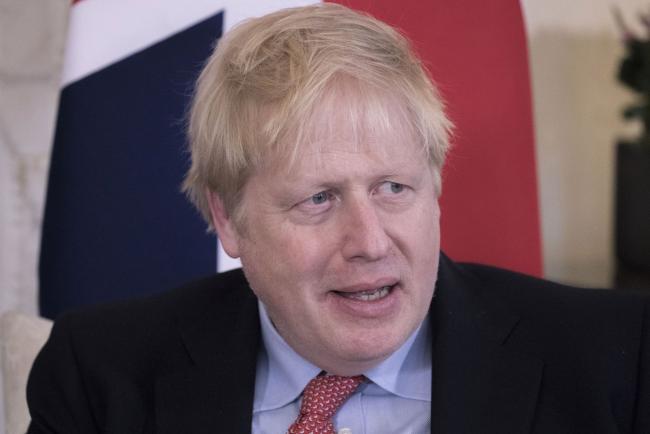 © Bloomberg. Boris Johnson, U.K. prime minister, reacts during his bilateral meeting with Andrej Plenkovic, Croatia’s prime minister, at number 10 Downing Street in London, U.K., on Monday, Feb. 24, 2020. Photographer: Jason Alden/Bloomberg
© Bloomberg. Boris Johnson, U.K. prime minister, reacts during his bilateral meeting with Andrej Plenkovic, Croatia’s prime minister, at number 10 Downing Street in London, U.K., on Monday, Feb. 24, 2020. Photographer: Jason Alden/Bloomberg(Bloomberg) — Just as the U.K.’s trade negotiations with the European Union look like they’re heading off a cliff, there’s reason to suspect things might not be as bleak as they seem.
On the surface, the brinkmanship is clear: On Tuesday, the EU dared Boris Johnson to walk away from the talks by his Oct. 15 deadline if he views a deal as impossible. The very next day, Johnson’s government said it fully intends to do just that, if that’s what it concludes.
That followed weeks in which statements from both sides have barely gone beyond reiterating the need to keep trying because the gulf between them remains huge. On Wednesday, EU Council President Charles Michel urged the U.K. to “put its cards on the table.”
Yet, in private, officials are more upbeat. While the politics are inescapable — and may yet be definitive — experienced negotiators know that sometimes the worst moments happen shortly before an accord is struck.
They recall Johnson’s telephone call with German Chancellor Angela Merkel in October 2018, which prompted one U.K. government insider to brief that, because of her intransigence, a deal on the country’s withdrawal from the EU was effectively impossible. One was done nine days later.
The two sides are now trying to reach an accord not only on their future trade relationship, but also on a range of issues from co-operation on law enforcement to transport. Failure to reach an agreement by the time U.K. leaves the EU’s single market and customs union on Dec. 31 would leave businesses grappling with tariffs, costs and disruption at the border.
Stock-Taking
Johnson has said that if he doesn’t see that a deal is on the cards by Oct. 15, he will pull the plug so businesses have time to prepare themselves.
The EU, whose leaders will discuss Brexit at a summit on the same day, doesn’t recognize that deadline and plans to carry on talking however long it takes.
Officials in Brussels with knowledge of the negotiations suggest an elaborate choreography is being worked out, in which, despite some level of differences remaining, both sides will find a way to carry on discussions into the second half of October.
The summit will be a mere “stock-taking” exercise, which won’t get in the way of the negotiations.
‘Eminently Achievable’
The EU’s chief negotiator, Michel Barnier, told a meeting of European ambassadors on on Wednesday that he didn’t expect the U.K. to walk away on Oct. 15, according to officials present.
Meanwhile, his British opposite number, David Frost, told a parliamentary committee that while there is “some really difficult stuff in there that’s not yet resolved,” the negotiations have been constructive.
“I think that a deal is eminently achievable, and could be achieved — but, equally, it is possible that we don’t get there, and we’ll have to see what the next few weeks bring,” Frost said at a hearing alongside Cabinet Office Minister Michael Gove.
There are signs, too, that the two sides are getting closer to overcoming some the biggest obstacles to a deal: what rules limiting state aid the U.K. will have to follow, and what access EU fishing boats will have to British waters.
Frost told lawmakers that the U.K. is prepared to discuss conditions on business subsidies that go beyond what “you normally do in a free trade agreement.”
And Barnier told the meeting of ambassadors that member states should be willing to be more flexible on fish, an official said. France has lobbied hard to preserve the the bloc’s current access to British waters, something Johnson’s government has said is unacceptable.
EU officials are also increasingly confident that Johnson will agree to continue to apply the principles of the European Convention on Human Rights — something hardliners in his ruling Conservative party have previously resisted.
Experienced officials in Brussels note that the mood music around a negotiation is good when both sides start talking the same language. On that, too, there are signs of progress.
After a telephone call with Johnson on Wednesday afternoon, Michel tweeted that “the EU prefers a deal, but not at any cost.”
Shortly afterward, Gove was asked for his assessment. “We are obviously keen to get a deal,” he said, but “we will not do a deal at any price.”
©2020 Bloomberg L.P.




0 Comments:
Post a Comment